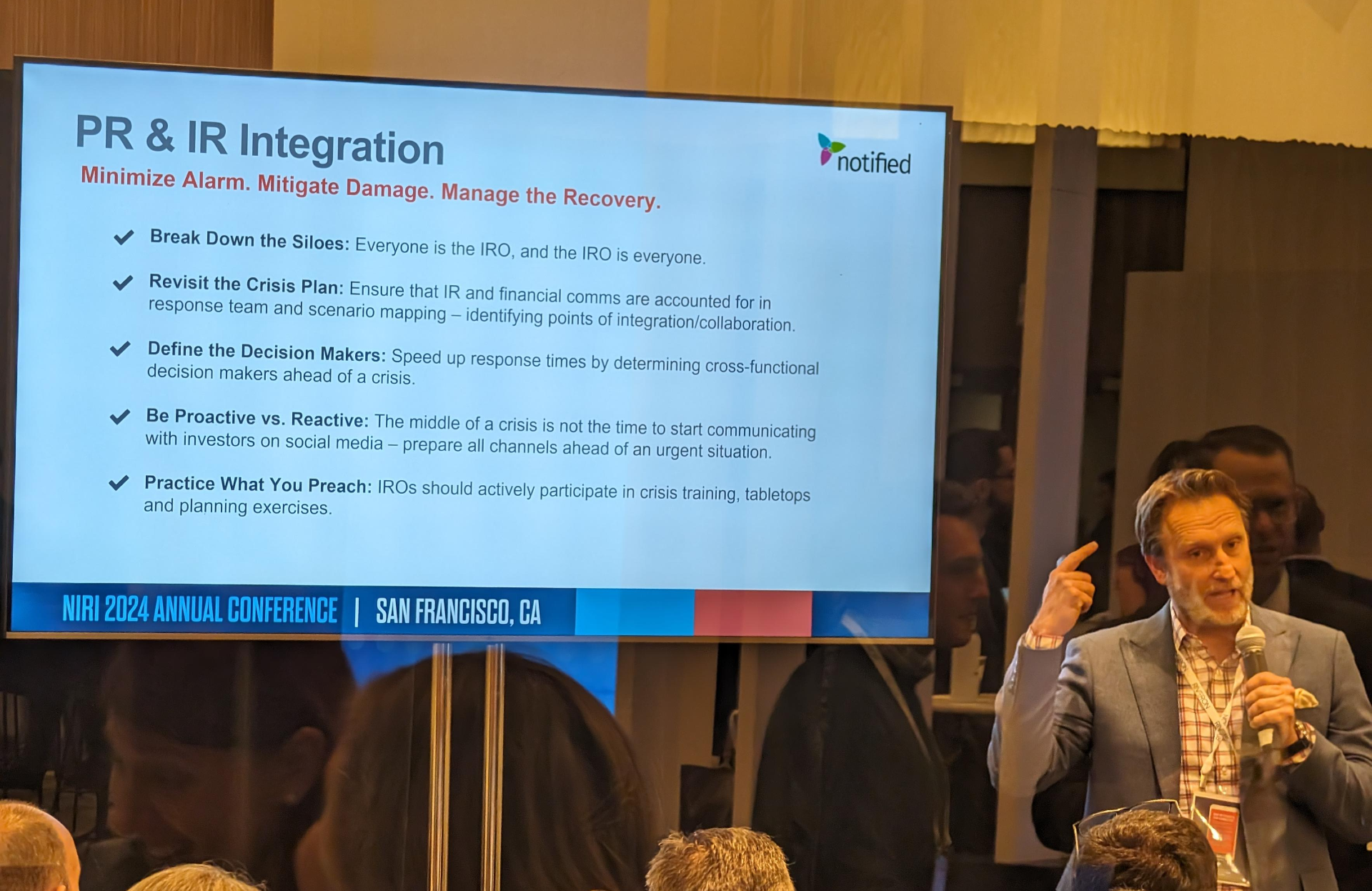Share this
Navigating Crisis Communications: Aligning IR and PR Teams
by The Notified Team on Jul 8, 2024 8:59:00 PM
At last month’s NIRI Annual Conference, Adam Christensen, Chief Marketing Officer at Notified, led an engaging discussion on the evolving responsibilities of investor relations pros.
Specifically, his presentation shed light on the critical need for seamless collaboration between IR and public relations teams when it comes to crises.
Keep reading to explore the key takeaways that can help your organization successfully navigate a crisis situation.

The New Crisis Landscape
Christensen kicked off his talk by emphasizing the types of crises companies face today, including shareholder and employee activism, technical failures, organizational issues and financial challenges.
His main takeaway? IR now goes beyond just financial reporting, involving proactive engagement and clear communication.
He stressed the importance of IR teams putting technology to work when it comes to crisis management. This requires using new tools - such as media monitoring and generative AI - to improve response times and reduce risk.
To illustrate his point, he shared key statistics that highlight this need:
- In one-third of all organizations, employees are unaware of crisis plans and their contents.
- Only 49% of businesses in the U.S. have a formal, documented crisis communication plan.
- Two-thirds of organizations have moved towards integrated resilience programs, but only 1 in 5 are fully integrated.

Investor Relations' Evolving Role
Christensen outlined the expanded role of IR, which now includes:
- Messaging Development - Crafting clear, consistent messages that resonate with both investors and the bigger public.
- Transparent Investor Engagement - Building trust through ongoing dialogue and transparent communication.
- Communications Roadmap - Developing a strategic plan for crisis communication and routine investor updates.
- Ongoing Reputation and Brand Management - Continuously monitoring and managing the company’s public perception.
- Media Monitoring and Reporting - Keeping a close watch on media coverage and social media conversations.
- C-Suite Advisement - Providing critical insights and recommendations to senior executives.
- Public Relations Alignment - Coordinating closely with PR teams to ensure unified messaging and media response.
And it’s this alignment, this coordination, that’s integral for creating successful outcomes.
PR and IR Integration: Best Practices for Success
One of the biggest takeaways from the discussion was the importance of breaking down siloes between IR and PR teams.
Effective collaboration between the two groups can minimize alarm, mitigate damage and manage recovery during a crisis.
He shared several best practices for achieving this integration that you can start applying at your organization today:
- Break Down the Siloes - Ensure that everyone in your organization understands the IR function and its importance. The IRO should be seen as a central figure in crisis communication.
- Revisit the Crisis Plan - Regularly update crisis plans to include IR and financial communications. Scenario mapping should identify integration points between IR and PR.
- Be Proactive vs. Reactive - Prepare communication channels in advance. The middle of a crisis is not the time to start engaging with investors on social media.
- Define the Decision-Makers - Speed up response times by determining cross-functional decision makers ahead of a crisis.
- Practice What You Preach - IROs should actively participate in crisis training and planning exercises.

Real-World Scenarios and Collaborative Strategies
To close the discussion, Christensen presented three real-world scenarios to illustrate how IR and PR collaboration can effectively see an organization through a crisis:
- Short-Seller Attack - Negative reports from short-sellers can damage a company’s reputation. IR and PR must build a coordinated response plan, develop key messaging and monitor the story’s evolution. IR can help PR prioritize investor concerns to ensure long-term impact on mitigation efforts.
- Ransomware Attack - While IR focuses on SEC disclosures, ransomware attacks can have long-term reputational impacts. Collaborative efforts with PR ensure that mitigation activities are communicated beyond public filings, managing the narrative in the press and working cross-functionally to restore trust.
- Company Layoffs - Layoff rumors can quickly spread on social media, causing misinformation and panic. IR should be involved in internal communications planning, messaging and media monitoring to manage the situation effectively.
The Road Ahead for IR and PR
Christensen stressed the importance of continuous improvement in crisis management. He encouraged organizations to revisit and refine their crisis plans regularly, engage in scenario planning and stay attuned to emerging risks.
By fostering a culture of communications collaboration - and leveraging technology - organizations can navigate crises more effectively, control the narrative and protect their reputation.
About Notified
At Notified, we champion the corporate storyteller. We empower investor relations and public relations professionals with the tools, technologies and expertise to tell their stories powerfully, effectively and flawlessly.
Relied on by more than 10,000 global clients, we enable IR and PR teams to stay in control of their corporate narrative with a suite of world-class, award-winning solutions and dedicated customer service team. Our end-to-end communications solutions include everything from GlobeNewswire press release distribution, social listening and media monitoring to earnings calls, IR websites and investor days.
With Notified, your story goes here.
Learn more at notified.com and follow us on LinkedIn.
Share this
- Public Relations (225)
- Press Releases (115)
- Press Release Distribution (94)
- GlobeNewswire (90)
- Investor Relations (88)
- PR Communications (75)
- Artificial Intelligence (72)
- Media Relations (50)
- IR Communications (41)
- Media Contacts Database (40)
- Global News Distribution (32)
- Webinar (32)
- IR Websites (30)
- Earnings Calls (22)
- Notified PR Platform (21)
- IR Webcasts (19)
- Experiences (17)
- Studio Webinar Platform (17)
- Virtual Events (17)
- Writing Tips (17)
- Case Study (16)
- PR Trends (16)
- Webcasts (16)
- PR Measurement (15)
- Generative AI (13)
- Media Monitoring (13)
- Event Technology (12)
- Investor Days (12)
- Webinar Strategy (12)
- ESG (10)
- Social Media (10)
- IR Event Platform (9)
- Newswire (9)
- United Kingdom (9)
- Virtual Event Platform (9)
- Accessibility (8)
- Earnings Day (8)
- Earnings Release (8)
- News Roundup (8)
- Regulatory Filing (8)
- Germany (6)
- Report (6)
- Social Listening (6)
- CLEAR Verified (5)
- IR Hub (5)
- Video (5)
- Webinar Engagement (5)
- Brand Storytelling (4)
- Misinformation (4)
- PR Agency (4)
- SEO (4)
- Trust (4)
- IR Trends (3)
- Journalism (3)
- AGM (2)
- Awards (2)
- Branding (2)
- CSR (2)
- Capital Narratives (2)
- DEI (2)
- Demand Generation (2)
- Insights & Analytics (2)
- ROI (2)
- Sentiment Analysis (2)
- Webhosting (2)
- Annual General Meeting (1)
- Canada (1)
- Emojis (1)
- Equiniti (1)
- Events (1)
- France (1)
- Halloween (1)
- Internal Communications (1)
- Internships (1)
- Life At Notified (1)
- Mark Cuban Foundation AI Bootcamp (1)
- Marketing (1)
- News Briefs (1)
- News Releases (1)
- PRSA ICON (1)
- Product Launch (1)
- Retail Investors (1)
- SXSW (1)
- Share of Voice (1)
- Sponsorships (1)
- Success Story (1)
- White Paper (1)
- eBook (1)
- September 2025 (4)
- August 2025 (6)
- July 2025 (9)
- June 2025 (12)
- May 2025 (9)
- April 2025 (11)
- March 2025 (11)
- February 2025 (6)
- January 2025 (12)
- December 2024 (12)
- November 2024 (12)
- October 2024 (14)
- September 2024 (15)
- August 2024 (14)
- July 2024 (14)
- June 2024 (14)
- May 2024 (12)
- April 2024 (13)
- March 2024 (13)
- February 2024 (15)
- January 2024 (11)
- December 2023 (7)
- November 2023 (13)
- October 2023 (14)
- September 2023 (7)
- August 2023 (8)
- July 2023 (7)
- June 2023 (8)
- May 2023 (8)
- April 2023 (5)
- March 2023 (5)
- February 2023 (8)
- January 2023 (9)


